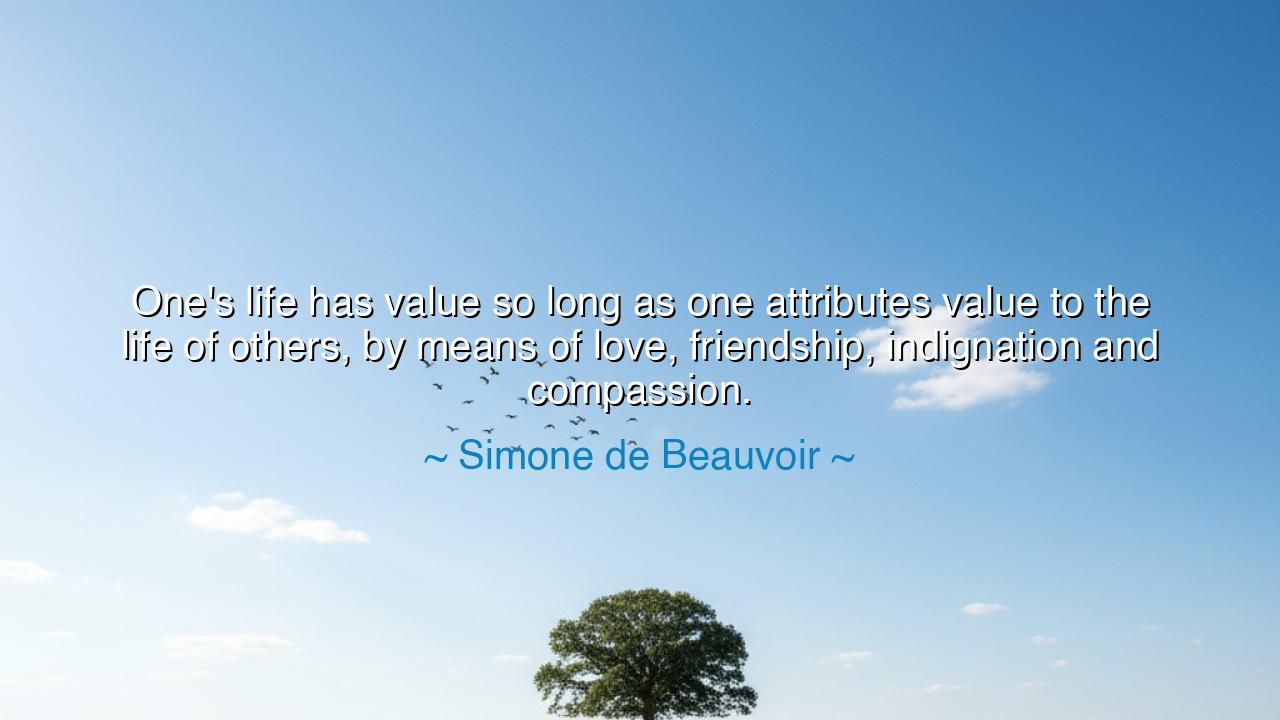
One's life has value so long as one attributes value to the life
One's life has value so long as one attributes value to the life of others, by means of love, friendship, indignation and compassion.






“One’s life has value so long as one attributes value to the life of others, by means of love, friendship, indignation and compassion.” — these are the words of Simone de Beauvoir, the philosopher who gazed into the heart of existence and spoke with the voice of both fire and tenderness. In this single sentence she reveals a sacred secret: that the worth of life is not measured by the gold we gather, nor the power we command, but by the love we give, the friendship we nurture, the indignation we feel at injustice, and the compassion we extend to those in pain. To live for oneself alone is to dwell in a desert of mirrors. To live for others, even in small ways, is to cause the barren ground to bloom.
The meaning of her words lies in this truth: life gains value only when it transcends the self. Man is not an island adrift upon the sea of time, but a bridge—connecting one soul to another. When our hearts awaken to the suffering, the joy, the dignity of others, our existence becomes luminous. Without this awakening, even the longest life is but a shadow passing through dust. Simone de Beauvoir, who lived through the great storms of the twentieth century, saw nations crumble under greed and cruelty. She knew that a civilization survives not through its monuments, but through its mercy; not through its victories, but through its capacity to love.
There is a noble anger, too—a righteous indignation—that gives worth to our days. To see wrong and remain silent is to betray the divine spark within. De Beauvoir’s mention of indignation is no accident. She calls upon the moral courage that refuses to accept the suffering of the innocent. Think of Oskar Schindler, the man who in the midst of war and hatred risked his fortune and his life to save hundreds from the fires of destruction. He was not a saint by birth, nor a hero by design. But the indignation of his conscience, the compassion in his heart, transformed his destiny. He found value in his own life because he gave value to the lives of others.
And what of friendship, that sacred bond between souls? Friendship is not mere company—it is the acknowledgment that another being’s existence enriches our own. To cherish a friend is to say, “Your joys are my joys; your wounds are my wounds.” In that shared humanity, the soul expands beyond its small cage of self. The ancients knew this well. In Greece, friendship was called philia—a love that upheld cities and empires. For what is a polis, what is a people, if not the web of friendships and loyalties that hold them together? Without friendship, no society can stand; without compassion, no heart can live.
The origin of de Beauvoir’s thought lies in her philosophy of existential humanism, where man defines himself through his choices and his relationships. She rejected the emptiness of selfish freedom and taught that freedom finds meaning only when it recognizes the freedom of others. Thus, the value of one’s life is born in the act of giving—to love, to defend, to heal, to lift another. Every moment in which you choose to affirm the worth of another person, you reaffirm your own existence as something sacred.
Yet beware, for this path is not easy. To feel compassion is to allow one’s heart to be pierced. To stand in indignation against wrong is to invite struggle. But it is precisely in this pain that our souls grow vast and radiant. The tree that never faces the storm grows crooked and hollow; the heart that never suffers for others remains shallow. To attribute value to the lives of others is to walk the road of courage, humility, and grace. It is the way of the wise, the way of those who make light out of darkness.
Let us then draw the lesson from de Beauvoir’s flame: if you wish your life to have meaning, do not seek it in isolation. Seek it in love, in service, in the fierce defense of what is good and just. Look upon every person not as a rival, but as a reflection of your own humanity. Practice friendship that uplifts, compassion that acts, and indignation that transforms apathy into change. Begin with small acts—help a neighbor, listen without judgment, stand for one who has no voice.
For when you live in this way, every breath becomes sacred, every day becomes purpose. You will discover, as Simone de Beauvoir did, that life’s true value is not something earned or achieved, but something bestowed through love. And when your final hour comes, you will not measure your days by what you possessed, but by those whose lives you have touched—and whose light now burns because you once chose to care.






AAdministratorAdministrator
Welcome, honored guests. Please leave a comment, we will respond soon